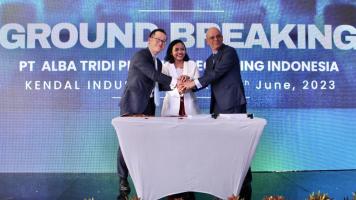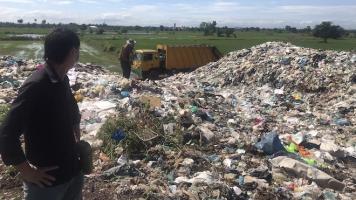Workers at a plastics recycling plant in Indonesia. Photo credit: ADB.
In Southeast Asia, waste startups nurture a culture of waste segregation, reduction, and recycling.
Digitalization offers innovative solutions for tackling increasing rates of waste generation, a bane of rapid urbanization. Pilot projects in Southeast Asia show that using digital tools to engage and connect waste generators, collectors, and city or municipal government administrators can help improve efficiency in solid waste management and even reduce wastes.
In Cambodia, ADB is financing the rollout of a digital platform to improve both solid waste collection and revenue collection in five towns in the Tonle Sap Basin. The digital platform was introduced in Battambang, Cambodia’s third largest city, in 2023. It enabled residents to check the garbage collection schedule and their bill on their mobile device through an app. Meanwhile, the city government uses the digital platform to track the collection of solid waste by garbage trucks using (Global Positioning System) GPS data and monitor bills distribution and payment. The new system has improved service delivery. Satisfied customers paid their bills diligently, resulting in a substantial increase in revenues from the garbage collection service.
Battambang, which is a pilot city in the ASEAN Smart Cities Network, also considered other digital solutions to improve solid waste management. These include enabling e-payments to improve fee collection and putting radio frequency identification (RFI) tags on bins and skips or using drones and smartphones to monitor waste collection.
Enabling a circular economy
In Indonesia, social enterprise Alner uses digital technology to support its deposit–return business model. To help reduce plastic wastes from households, particularly single-use sachets and pouches, Alner (short for “alternative container”) sells household essentials like shampoos, liquid soaps, and seasonings in reusable bottles. The company uses a fully traceable distribution system, including a QR code system, and has integrated software solutions with partner companies and retailers to streamline the reverse logistics process. This innovative solution won ADB’s Technology Innovation Challenge for Healthy Oceans award, which provided early stage financing for a pilot in the Greater Jakarta area for one year. Alner sold 57,500 units of reusable packaging during the period and avoided 100,239 single-use plastic sachets and pouches from ending up in landfills and oceans.
In the Philippines, a smart waste management system was developed to prevent plastic waste from leaking into waterways and the ocean. Improving solid waste management helps prevent marine litter. The UN-Habitat project was pilot-tested in Legazpi City in Albay province in 2023 to gather solid waste collection data, including data from materials recovery facilities, which was previously not captured. The system uses real-time data and analytics through Internet of Things and GPS tracking. It enabled the city to optimize waste collection routes, reducing travel time, operational costs, and carbon footprint.
In Singapore, local waste company 800 Super introduced smart recycling boxes and lockers and a system for awarding points to users that segregate their wastes properly. The points can be exchanged for shopping vouchers through an app. This initiative is helping promote the practice of waste sorting at the household or community level.
Designed for inclusivity
A study by ADB suggests that digital solutions in waste management benefit women the most since the tasks of sorting and disposing garbage often fall on them. “They value digital solutions that are easy to navigate and support them in these tasks, providing clear access to information on how to sort and on the value of the recyclables they are selling. This fosters trust and transparency, as they do not need to negotiate prices, and feel fairly compensated. Some women also appreciate the option to schedule pickups with different collectors to support various individuals in their community,” such as informal waste workers.
Research focused on Indonesia and Viet Nam to study how digital solutions can help women improve plastic waste management and support circular economy initiatives.
According to the study, there are several organizations in Indonesia that provide app-based services that connect waste pickers, aggregators, and buyers to facilitate waste collection and recycling. The country has a more developed digital waste ecosystem compared with other countries in the region, with some organizations, such as Plastic Bank, using blockchain technology. Digital platforms are able to track the type and quantities of recyclables collected and traded as well as secure and trace transactions. App users are also able to track their environmental contributions.
Viet Nam has just started to deploy digital solutions for waste management. Digital services typically connect informal waste workers with households and recycling centers.
Digital solutions are also used in these countries to promote best practices in waste management and disposal. Some apps provide daily tips, guidelines, and detailed instructions on proper waste sorting and recycling. Social media platforms and online games are also used to reach a younger audience and to promote incentive programs, such as exchanging waste for cash or vouchers.
“The experiences from Indonesia and Viet Nam highlight that effective engagement with waste collectors and intermediaries requires platforms to be designed with inclusivity in mind,” says the report. “This includes lowering barriers to entry by providing access to user-friendly technology and essential infrastructure, such as smartphones, reliable internet, and transportation; and offering continuous training and support. Additionally, financial services must be accessible and relevant to the diverse needs of informal workers.”
In addition, waste startups, including those in the digital space, need access to finance in order to scale their operations and expand services beyond major cities.

